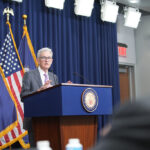CAPATA Financial’s take on today’s FOMC press conference and announcement:
Notable comments from Chairman Powell during today’s FOMC press conference and announcement.
From the FOMC Statement :
- “The unemployment rate has stabilized at a low level in recent months, and labor market conditions remain solid. Inflation remains somewhat elevated.”: The Fed had previously indicated in recent statements, and Powell has reinforced in press conferences, a shift in policy response toward concerns about unemployment as the mandate most likely to deviate from its assigned goals of maximum employment and price stability. This statement suggests a shift away from employment concerns with the use of ‘stabilized at a low level’ language. The Fed continuously assesses the balance of risks in achieving its dual mandate and will adjust policy to address the goal that is—or is likely to be—moving away from its intended target.
From the FOMC press conference:
- “If the economy remains strong and inflation does not continue to move sustainably toward 2 percent, we can maintain policy restraint for longer.”: Powell’s prepared statement emphasized labor market stability and that he has hedged his bet by saying that policy may remain on hold (mildly restrictive) at current levels due to the uncertainty of the direction of inflation. He reiterated that there is uncertainty around tariffs, immigration, fiscal, and regulatory policy with the new administration, specially how those policies transmit into the economy.
- “We seem to be set up for further progress [inflation], but seeming to be set up is one thing, having it is another.”: Powell addressed a reporter’s question by reiterating the ongoing theme that while significant progress has been made on inflation—now below 3%—it has not yet reached the 2% target sustainably. This supports his policy stance, which he describes as restrictive but 100 basis points less restrictive than before.
- “…at 4.3% we are above pretty much everyone’s estimate on the committee of the longer-run neutral [rate]. I think our eyes are telling us that our policy is having the effects on the economy-that’s really the question we ask…you really have to look out the window and see how your policy rate is affecting the economy. ”: Powell made these comments in response to a reporter’s question about how far they were from neutral. He reiterated that no one knows precisely where neutral is at any given time, but its effects can be observed through the economy’s reaction. The reference to ‘looking out the window’ has been used before and is often associated with illustrating the challenges of the Fed’s job. In his 1998 book Central Banking in Theory and Practice, Alan Blinder discusses how FOMC members can sometimes be misled by current economic conditions and emphasizes the need for humility when deciding when to tighten or loosen policy, given the ‘long and variable lags’ in its transmission into the economy.
- “…I would say they [asset prices] are elevated by many metrics right now…” : This comment is significant because most Fed Chairs avoid discussing stock market valuations. Alan Greenspan famously made waves with his December 1996 ‘irrational exuberance’ speech when the stock market was approaching 100% of GDP. In his autobiography, Greenspan reflected on this speech, noting that he believed asset prices were ‘elevated,’ only to see the market continue its upward trajectory until 2000.
- Balance sheet runoff (QT): Powell provided no indication of the future path of quantitative tightening (QT), other than stating that the committee is considering multiple factors to assess when reserves in the banking sector decline from their current levels, which he described as abundant. The goal is to transition reserves to a level slightly above ample. Notably, the Fed is 0–1 in balance sheet reduction attempts. In 2019, its first effort ended with a much higher level of reserves than the committee had estimated, prompting the New York Fed’s open market desk to intervene in September 2019. The Fed is now aiming to avoid a repeat of that scenario.
In summary, Powell deemphasized the committee’s recent shift toward focusing policy responses on a potential weakening in the labor market, instead highlighting that unemployment remains low and stable. This shift signals that the committee is currently more concerned about inflation either rising further or failing to continue its path toward the Fed’s 2% target. With the Fed Funds rate at approximately 4.3%, Powell views this level as somewhat restrictive and believes that further tightening—primarily through continued balance sheet reduction via quantitative tightening (QT)—will help exert downward pressure on inflation. Monetary policy is always a balancing act in risk mitigation, using policy tools to address the variable that is either the most likely or the furthest from its intended target.
With policy on hold for now, an important question arises: What impact will a ‘higher for longer’ Fed Funds rate have on the economy, particularly through the continued transmission of higher Interest on Reserves (IOR) and Interest on Excess Reserves (IOER) in the post-financial crisis ample-reserve monetary policy regime? Could a ‘higher for longer’ Fed Funds rate actually be more stimulative under today’s monetary policy framework?

Source: Federal Open Market Committee (FOMC), Press Conference, January 29, 2025
The content is developed from sources believed to be providing accurate information. The information in this material is not intended as tax or legal advice. It may not be used for the purpose of avoiding any federal tax penalties. Please consult legal or tax professionals for specific information regarding your individual situation. This material was developed and produced to provide information on a topic that may be of interest. The opinions expressed and material provided are for general information, and should not be considered a solicitation for the purchase or sale of any security.
CAPATA Financial LLC offers wealth management services through various unaffiliated companies including advisory services offered by Diversify Advisory Services (“Diversify”) an SEC registered investment adviser. CAPATA Financial LLC offers additional investment services and securities through DFPG Investments, LLC., a broker/dealer, member FINRA / SIPC, and an affiliate of Diversify.


